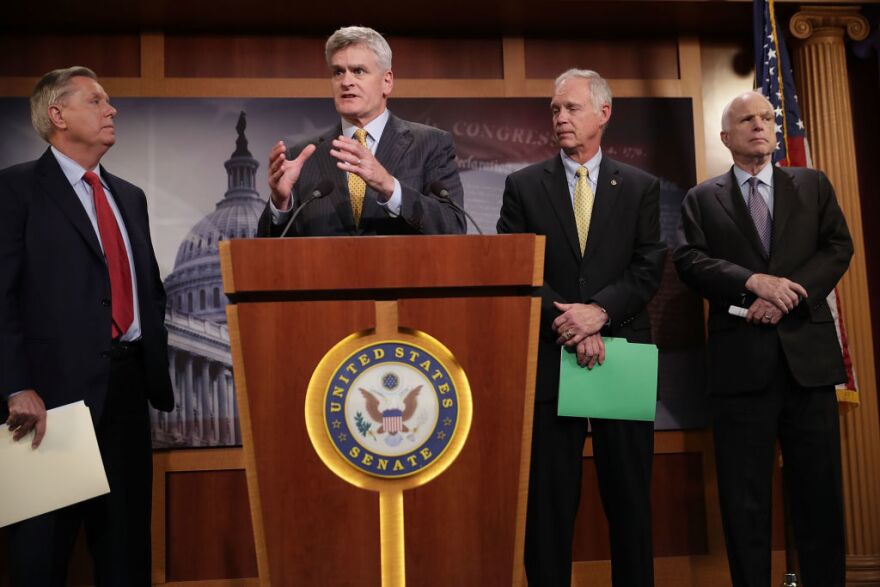Updated at 8:15 p.m. ET
The Republican's seven year quest to repeal and replace the Affordable Care Act descended into chaos Thursday night as the Senate prepared for an unwieldy, all-night session.
The contentious debate has left Republicans in an uncomfortable position where the only legislation they can pass is a bill most senators oppose. Several said they would only vote for the so-called skinny repeal on the condition that the House never take it up and it never becomes law.
Democrats, meanwhile, are united in opposition to any bill that would undo President Obama's legacy on health care.
Senate Majority Leader Mitch McConnell, R-Ky., and others continued to work on the skinny repeal effort all day Thursday. The goal is to offer legislation that would allow Republican lawmakers to return home for the August recess and say they've taken action on an issue that's been one of their key campaign promises for years.
The bill's language is not yet final or public, but as NPR's Sue Davis reports on All Things Considered, it is said to involve some combination of repealing the individual mandate, some of the taxes in the ACA, defunding Planned Parenthood for at least a period of time and allowing states to opt out of some of the minimum standards of coverage for insurance plans that the Affordable Care Act requires.
In an impromptu press conference held Thursday evening, Sen. Lindsey Graham, R-S.C., along with three other Republican senators, stressed they would vote for the "skinny repeal" bill only with more assurances that the bill, if passed, would actually not become law.
They want it to proceed to a conference committee, where House and Senate members would work on crafting another bill that uses each chamber's bill as a starting point to compromise on final legislation — instead of having what the Senate passes sent directly to the House floor for a vote.
Graham called the "skinny" bill "a disaster" and "a fraud."
"I'd rather get out of the way and let it collapse than have a half-ass approach where it is now our problem," Graham said.
Sen. John McCain, R-Ariz., who joined his friend Graham at the press conference, said the Republican effort to replace Obamacare deserves more time and consideration than it was being given.
"I believe one of the major problems with Obamacare is that it was rammed through Congress by Democrats without a single Republican vote," McCain said. "I believe we shouldn't make that same mistake again."
McCain added, "It's time we sat down together and came up with a piece of legislation that addresses this issue."
However, it is unlikely that if the bill makes it to conference with the House that it will involve Democratic input, if the stated goal continues to be repealing the Affordable Care Act.
Graham and McCain were joined at the press conference by Sen. Ron Johnson, R-Wis., and Sen. Bill Cassidy, R-La.
The strategy of supporting the "skinny repeal" is not one a lot of Republicans want to get behind. If it does become law, a "death spiral" could begin — which means that without a mandate to buy insurance, younger people who tend to be healthier will drop their insurance, keeping sicker people in the market and then premiums go up because their costs are higher. The bill may leave in place subsidies, however.
But all day lawmakers were either unclear what would be in the bill, or suggesting that they would pass whatever it might be, simply to extend the process. From passage, the bill could go straight to the House floor for a vote, or move into a conference committee. In conference, legislators must work with provisions that are already in either bill, they may not add new provisions.
"If moving forward requires a conference committee, that is something the House is willing to do," House Speaker Paul Ryan said in a statement Thursday evening. "The reality, however, is that repealing and replacing Obamacare still ultimately requires the Senate to produce 51 votes for an actual plan. The House remains committed to finding a solution and working with our Senate colleagues, but the burden remains on the Senate to demonstrate that it is capable of passing something that keeps our promise, as the House has already done."
Meanwhile, the House has advised lawmakers not to make any plans to leave Washington until it's clear what the Senate will do. It is possible that the House will vote on a motion to go to conference on Friday before they leave town as that assurance.
But House leaders have also passed a "martial law" rule that would allow them to bring a bill to the floor in the coming days if necessary. They say that was a protective move to give themselves flexibility, but it spooked senators and others that the House would try to move the Senate bill for a quick vote.
Copyright 2021 NPR. To see more, visit https://www.npr.org.




